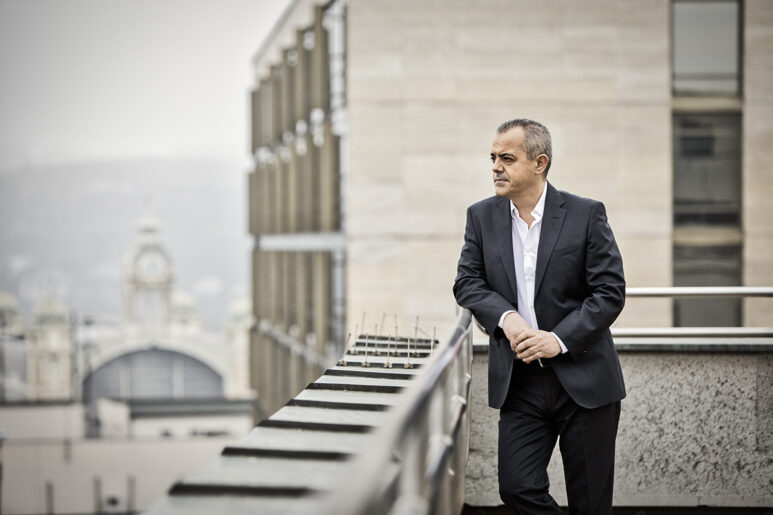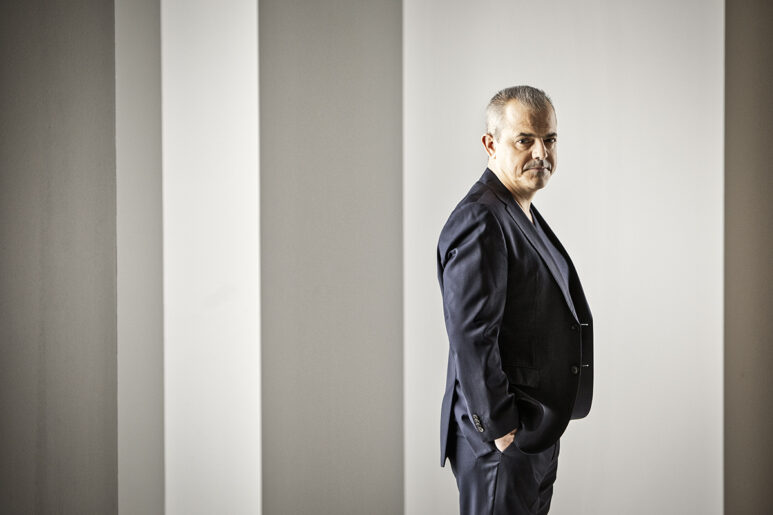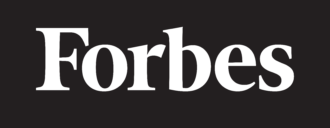Photo: © Libor Fojtik (special thanks to Veletržní palác, Národní galerie Praha)
Philippe Riboton is a hunter. His hunting grounds are the top levels of global firms, his prey top managers. The headhunting company of this French entrepreneur has a seat in Prague but fills positions in businesses around the world. HR Partners focuses on candidates that are usually not easy to get. Even more so in the time of crisis when everyone is concerned about the future and prefers to hold on to current positions. Philippe Riboton has recently focused on the corporate governance theme. He organized a series of online debates with CEO’s of Czech and international companies where they discussed the future of work and how to survive the crisis. He came across an interesting phenomenon: a large number of leaders sees the crisis as an opportunity to restart their approach to enterprise and to economics. “The coronavirus pandemic is not the only crisis that humanity is facing. Quite likely we can expect a combination of crises, from economic and social to climate and migration. And this is a chance to learn and be better prepared,” the headhunter says.
What are the biggest challenges leaders face in COVID times?
Today’s leaders face a new world which some leadership analysts have described with the acronym “VUCA” – V for Volatility, U for Uncertainty, C for Complexity and A for Ambiguity. No one knows what the future will bring. We can’t think that we will get vaccinated and everything will be normal again. And although public spending has been massive, a certain percentage of companies will not come back too soon to their pre-COVID level. Not to mention that some of them will go pretty fast into insolvency and bankruptcy as they won’t be able to face the repayment of their debts. The most recent Czech National Bank forecast anticipates a GDP contraction in the Czech Republic of 7.9% for 2020 and another GDP contraction of 2.7% for 2021. Most economists don’t see economic growth returning before 2022. It will undoubtedly lead to a social crisis with a severe hit on unemployment. Not to mention there’s also climate change and global warming. The UN predicts that there will be about 200 million climate migrants in 2050! So I would say that today’s biggest challenge for leaders is to face and accept uncertainty. And then look for ways to get the most from the current situation. Let’s not waste this crisis! It can be a historical opportunity for a proper reset!
What would such a restart look like, in your opinion?
Indeed I see COVID-19 as a call for change. And we need to change now! My opinion is that we did not really learn from the 2008/2009 crisis. We are witnessing governments speak about hundreds of billions spent to rescue their economy while the level of indebtedness of their country is completely unbearable. The way we behave is simply not sustainable. People need to wake up and realize we are consuming two planets per year! We have somehow fixed the financial system (as it went crazy with sophisticated but uncontrolled financial instruments such as the sub-primes) but we have not fixed the system in general. We have simply missed the opportunity! I believe that COVID-19 is a wake-up call on many issues – but it can be a historical opportunity for a proper reset. It is an opportunity to think for the long term and to face the real questions underneath the surface: climate change, loss of biodiversity and huge inequalities. And that should also translate to businesses. The system should support all stakeholders from employees, suppliers, to clients instead of supporting exclusively shareholders. Simply said we need to put the system at the service of the planet and humans, not the other way around.
What kind of companies are losers and winners of the crisis?
The companies who don’t see that there is a call for change in our societies will lose out. They will miss the boat and they might disappear in the same way that companies like Kodak or Nokia did not see the world changing in front of their eyes. Today’s economic power is no more exclusively in the hands of companies and brands: it is switching to the hands of consumers. They care for what they eat, where it comes from, how it was produced, how it could impact their health. They care how the companies they buy from behave, from a social or an environmental point of view. If they don’t like something, they can boycott them. As a result companies must adjust to them. The winners of the crisis will be companies who showed during the COVID crisis that they care: for their employees, for their clients, for the planet and for the common good. Employees and consumers will feel a stronger link to them. On the contrary those companies who will embark fast on restructuring and personnel reduction in order to please the financial markets will be hit and they will need time to recover in terms of respect. Just one example: IBM is about to slash 10,000 jobs in Europe less than a year after it acquired the Red Hat company for no less than USD 34 billion. How can people understand that?
On top positions in the Forbes Global 2000 list there are mostly companies from US and China and very few from Europe. Can the crisis be a chance for Europe to move back to the forefront of the global economy?
I am sad to see that Europe will not emerge too positively from this period. It did not manage to speak with a single voice, we saw protectionism grow and borders got re-established. We can overcome the global challenges that we face if we cooperate. We need to build bridges instead of walls. European companies can play a bigger role if they have the courage to fight protectionism and isolation.
How did the crisis affect your business? Did you have to change your business model?
Some of our assignments have either been postponed or purely cancelled. Especially those assignments where we were contracted to support our clients in finding senior managers in order to open new business lines or expand to new countries. But the good thing is that I moved my business model to virtual ten years ago. I travel a lot, so I built my business in such a way not to need any office. Not that I was so smart – but because it accommodates my needs. Being a headhunter does not mean you need to have lavish offices on the Champs-Elysées or on Wenceslas Square. By becoming completely virtual, not only did we lower our cost base but we gave ourselves a chance to support our clients almost anywhere. My company is registered in Prague but we have clients around the world. Since we could not travel because of lockdowns we have embarked on two waves of digital experience in order to reinforce our proximity with our clients. For instance with the “Surviving the Crisis” series of online interviews with Czech and international CEO’s in the spring of last year.

Photo: © Libor Fojtik (special thanks to Veletržní palác, Národní galerie Praha)
Before the crisis top managers could ask almost anything. How did the crisis affect their position on the job market?
I am afraid the situation has changed dramatically in most sectors. The golden era of managers is over. The salary fever is gone and will not return before at least 2022. Except maybe in the IT and the e-commerce sectors. Senior managers today tend to stay in their job. For us it means there is a very high resistance from managers to changing jobs as uncertainty is extremely high. For most managers these days there is no safe place anymore. And they might be right: there will be many major restructuring plans this year that will affect them too. It is obvious there will be many senior managers coming to the market in the months to come and I am afraid a lot of them will be over 50. I think we are about to see a generational phenomenon take place with a new generation taking over, namely the millennials.
How did the job market change in general?
The job market has been very severely hit. Most international companies at the very early stage of the first COVID wave decided to freeze hires. The priority was given to internal mobility: France for example registered last year a 35% drop in job opportunities for managers. And this year will be even worse. Most companies will activate restructuring plans in order to adjust to the “new normal”, which somehow means that “no decline is the new growth”. But the good news is that the future of work looks extremely interesting. In many companies they tested the home office model and found out the flexibility makes sense to them. It is very likely millions of people will become hybrid workers as they will work from anywhere and, I believe, will therefore get a better work/life balance.
Interview conducted by Jana Mertová and published in Czech on www.forbes.cz on January 4th, 2021.


